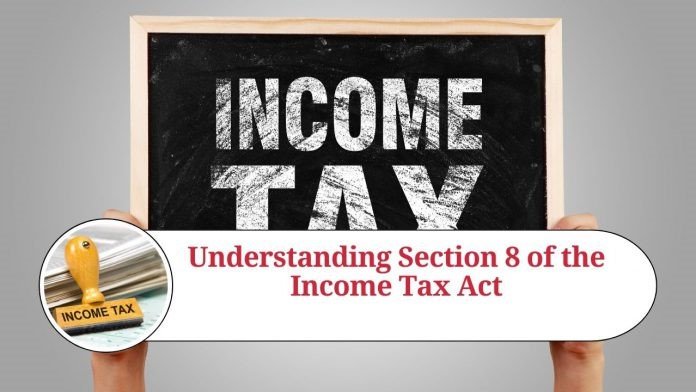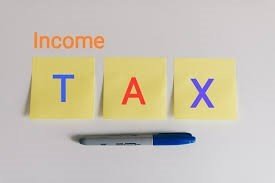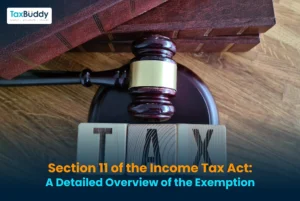When it comes to understanding income tax laws in India, Section 8 of the Income Tax Act, 1961 plays a crucial role in the taxation of dividend income. This provision outlines the taxation rules for charitable and religious trusts, as well as the declaration and taxation of dividends in certain companies. Whether you’re an investor, a business owner, or someone interested in tax laws, it’s important to comprehend how dividends are treated for tax purposes under Indian tax law.
In this blog, we will break down the important aspects of Section 8 related to dividend taxation and explore its implications for both businesses and individual taxpayers.

What is Section 8 of the Income Tax Act?
Section 8 of the Income Tax Act primarily deals with income tax exemptions for charitable and religious trusts or institutions. This section ensures that income generated by these organizations, which are set up with the purpose of charity or religion, is exempt from tax, provided certain conditions are met. However, this is distinct from the taxation of dividends in the hands of individual shareholders or businesses.
If you are looking for dividend-related tax provisions, you will want to explore other sections of the Act, such as Section 10(34) and Section 115-O, which govern the taxation and exemptions related to dividends received by taxpayers.
Dividend Income and Its Taxation under the Income Tax Act
Dividend income is a major source of passive income for many investors. Understanding the taxability of dividends is essential for managing finances effectively. Here’s a detailed breakdown of how dividends are taxed under the Income Tax Act:
1. Dividend Distribution Tax (DDT) – Section 115-O
Under Section 115-O of the Income Tax Act, Dividend Distribution Tax is levied on domestic companies. When a company declares dividends to its shareholders, it is required to pay DDT on the amount of dividend declared. This tax is payable before the dividend reaches the shareholder.
The key points to note here are:
- DDT is paid by the company, not the individual investor.
- The rate of DDT is typically 15%, but it may vary based on the type of dividend or recipient (individuals, HUF, etc.).
- After the DDT is paid, the dividend received by the shareholders is tax-free in their hands.
2. Taxability of Dividend Income – Section 10(34)
As per Section 10(34), dividends received by shareholders are exempt from tax in the hands of the individual, HUF, or any other taxpayer, as long as they have already been subjected to Dividend Distribution Tax (DDT) under Section 115-O.
This means that if you receive dividends from Indian companies, you won’t have to pay tax on that dividend income again, as the company has already paid the DDT on your behalf.
Key Points:
- Only the dividend income paid by Indian companies is exempt under Section 10(34).
- No tax is applicable on dividends that have been subject to DDT.
- If you are a shareholder, the company will distribute the dividend after DDT, and you don’t need to declare it as income in your tax return.
Key Legislative Amendments Regarding Dividend Taxation
Over the years, the Finance Act has brought about various amendments to the taxation of dividends, impacting both companies and individual investors:
- Finance Act, 1965:
- Introduced the concept of interim dividends and clarified the taxability of interim dividends, which are those declared before the finalization of the annual accounts of a company.
- Interim dividends are treated as income in the year they are unconditionally made available to shareholders.
- Dividend Income under the Companies Act, 2013:
- The Companies Act, 2013 outlines the declaration and payment of dividends by companies.
- Interim dividend can be declared by the Board of Directors, and it doesn’t require approval from shareholders. This flexibility allows companies to reward their shareholders throughout the year.
Special Provisions for Companies with Inadequate Profits
Under Section 123(1) of the Companies Act, 2013, a company is required to ensure it has sufficient profits to declare dividends. There are provisions for companies that have inadequate profits:
- A company can declare dividends out of its free reserves if it has not made enough profits in the current year.
- The declaration of interim dividends can also be made if the company’s financial health justifies it, even if it hasn’t declared the final dividend.
The provision ensures that only companies with enough reserves or profits can distribute dividends, protecting the financial stability of the business.
Tax Considerations for Dividend Income
As an individual or a business receiving dividend income, it is crucial to understand the tax implications to ensure compliance with tax laws:
- Dividend from Foreign Companies: Dividends received from foreign companies are taxable under the Income Tax Act, and you may need to declare them under “Income from Other Sources.”
- Tax Deducted at Source (TDS): In certain cases, companies may deduct TDS on dividend payouts. The rate of TDS depends on the nature of the dividend and the recipient.
FAQs
1. Are dividends taxable in India? No, dividends from Indian companies are exempt from tax in the hands of shareholders, as long as the company has paid Dividend Distribution Tax (DDT).
2. How is Dividend Distribution Tax calculated? DDT is calculated as a percentage of the total dividend declared by a company. It is typically 15%, but the rate can vary depending on the type of dividend.
3. Can a company declare dividends without profits? Yes, a company can declare dividends from its free reserves, even if it has no profits for that financial year.
Conclusion
Understanding the taxation of dividend income under the Income Tax Act is essential for individuals, companies, and investors. Section 8 mainly pertains to income exemptions for charitable organizations, while Section 10(34) and Section 115-O provide clarity on the taxability of dividends. With legislative changes over time, the taxation system has become more structured, ensuring that companies and their shareholders comply with the appropriate tax provisions.
For investors, it is important to remember that the tax burden is primarily on the company, not the shareholders, as long as the company has paid the Dividend Distribution Tax (DDT). By staying informed and compliant with these provisions, you can maximize your returns and ensure smooth financial management.



